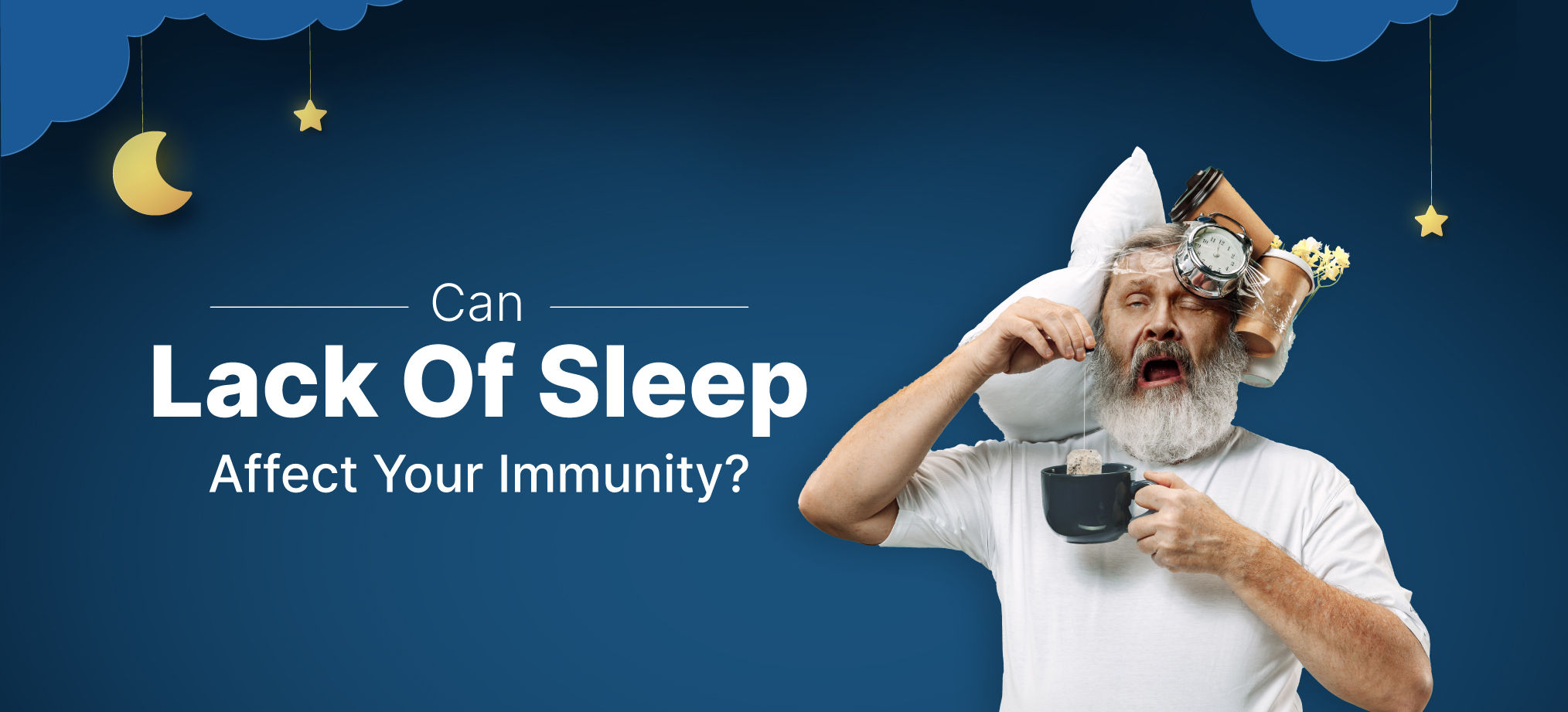General Health
How Sleeping Habits Affect The Immunity & Tips To Maintain Sleep Hygiene
3 min read
By Apollo 24|7, Published on - 06 April 2023, Updated on - 18 February 2024
Share this article
0
22 likes

Sufficient rest is necessary to keep our body functioning and to maintain optimal immune function. It is a known fact that the immune system defends the body against infectious agents, however, it relies on sleep to a great extent to function properly. Recent research has highlighted the link between sleep deprivation and a significant impact on immune function.
This article discusses the importance of good sleep and provides practical tips for improving sleep quality. Let's dive in and discuss some lifestyle changes you can inculcate in your daily lifestyle for better sleep quality and a strong immune system.
Also read: Why Good Sleep is Necessary to Keep Lifestyle Diseases at Bay
Are Sleep And Immune System Related?
The importance of sleep in boosting our immune system has been the subject of many studies. For instance, a recent survey revealed that those who logged less than six hours of sleep each night were more likely to fall prey to the common cold compared to their well-rested counterparts who slept for more than seven hours. Theories that highlight the relationship between sleep and the immune system include:
1. Cytokines are immune cells that are released when the body is exposed to trauma, inflammation, or a microbial attack. These powerful warriors are the key to developing an acquired immune response that can recognize and eliminate specific infections. However, scientists have found that without enough quality sleep, our bodies may not produce enough cytokines, leaving us more susceptible to infections.
2. Sleep also plays a vital role in our bodies restoration and healing. While we sleep, our bodies can recover and rebuild, giving us the chance to recuperate from the physical and mental pressures of the day. However, when we consistently fail to get adequate rest, our immune systems may become compromised, increasing our risk of developing infections and other illnesses.
3. Sleep deprivation reduces the ratio of white blood cells (another type of immune cell), further increasing the risk of illnesses and chronic inflammation.
Thus it's important to emphasise excellent sleep hygiene if you want to keep your immune system strong and feel well all around.
How Do Your Sleeping Habits Affect Your Immunity?
The immune system is the initial line of defence in your body against pathogens and illnesses. It is a complex network of tissues, organs, and cells that collaborate to keep you healthy. However, your sleeping patterns have a significant impact on your immune system. Let’s find out how.
1. Decreased Cytokine Production
Your body makes fewer cytokines if you're deprived of sleep, which might pose a challenge for your defences to fend off infections.
2. Increased Inflammation
Although inflammation is a normal reaction to an injury or an infection, when it persists over an extended period, it can weaken the immune system and increase the risk of developing chronic illnesses like diabetes, heart disease, and even cancer.
Also read: Relationship Between Sleep, Lower Back Pain, and Osteoporosis.
3. A Sharp Rise in Stress Hormones
Your body generates additional stress chemicals like cortisol when you don't get enough sleep. The immune system can get suppressed by these hormones, lowering your body’s ability to fight against diseases.
How To Maintain Sleep Hygiene?
Here are a few tips that might help you in maintaining a good sleep cycle:
- Follow a sleep schedule, which means sleeping and waking up at the same time every day.
- Ensure you’re consuming a well-balanced diet.
- Limit caffeine intake.
- Manage stress by practising mindfulness, meditation, and yoga.
- Indulge in more physical activities
So, the next time you're tempted to stay up late binge-watching your favourite show, remember that your immune system needs rest too. Getting enough sleep is one of the best things you can do to keep your immune system strong and healthy.
If you have trouble sleeping, Consult Sleep Disorder Specialists
Medically reviewed by Dr Sonia Bhatt.
General Health
Leave Comment
Recommended for you

General Health
Blood Cancer: Types, Causes, Symptoms, Diagnosis, Treatment
Blood cancer like leukemia & lymphoma leads to an increase in abnormal blood cells, which hinder your body from performing its regular function and can be life-threatening. There is no cure for cancer but there are several ways to treat it.

General Health
How To Choose The Right Omega-3 Supplement?
Unlock the secrets of Omega-3 oils and make informed choices. Learn how to select the ideal fish oil supplement for your well-being.

General Health
Do You Know That Your Body Can Harm Itself? Know How You Can Reduce That Risk!
Autoimmune diseases develop on their own and can be life-threatening. Read to know the early signs and the ways to prevent them.
Subscribe
Sign up for our free Health Library Daily Newsletter
Get doctor-approved health tips, news, and more.
Visual Stories

The Best Exercises for Controlling Blood Sugar Levels
Tap to continue exploring
Recommended for you

General Health
Blood Cancer: Types, Causes, Symptoms, Diagnosis, Treatment
Blood cancer like leukemia & lymphoma leads to an increase in abnormal blood cells, which hinder your body from performing its regular function and can be life-threatening. There is no cure for cancer but there are several ways to treat it.

General Health
How To Choose The Right Omega-3 Supplement?
Unlock the secrets of Omega-3 oils and make informed choices. Learn how to select the ideal fish oil supplement for your well-being.

General Health
Do You Know That Your Body Can Harm Itself? Know How You Can Reduce That Risk!
Autoimmune diseases develop on their own and can be life-threatening. Read to know the early signs and the ways to prevent them.
